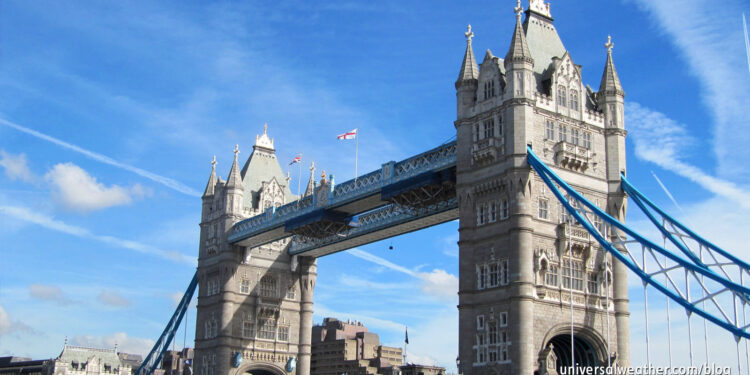Business Aircraft Operations in the UK: Hotels and Local Area

This is a post by author Jason Hayward. Jason is general manager for Universal Aviation U.K. – London-Stansted. Jason is an expert on business aircraft operations in the U.K. and can be contacted at jasonhayward@univ-wea.com.
This business aviation blog post is part of a series on operating in the UK and continues from our last article: “Business Aircraft Operations in the UK: Flight Planning, Weather & NOTAMs.”
Flight crews will find some of the best hotels in the world – from 5-star London-area properties to assorted restored castles in the countryside – here in the UK. There are also convenient international chain airport hotel options. Be aware that prices will be higher, and some hotels will sell out during high season.
The following is an overview of what you need to know:
1. Many good hotel options are available in the UK
The London area has many top-quality 4- and 5-star hotels to choose from – including most major U.S. hotel chains. Close to most airports, you will have hotels available and often 4-star options, including international chains. You will, however, run into limited hotel options from time to time. Cambridge, for example, has only one 4-star hotel, and you may have to drive farther to find a good hotel option when events are taking place in the Cambridge area.
2. High-season periods and local events reduce options and increase price
Prime tourism season for the UK is June through August, and many hotels – in the London area and elsewhere – sell out. London is the UK’s most popular leisure and business destination, and average crew rooms at 4-star properties are around £200 to £350 per night (including breakfast). Outside London expect to pay about £120 to £180 per night (including breakfast) for 4-star crew accommodations. Your ground handler may have negotiated crew rates available. Special crew rates, however, will not be honored when hotel occupancy rates are running high. If you utilize consumer websites to book rooms, you will not in most cases get crew rates or receive the additional services possible with ground handler-negotiated rates.
3. Know cancellation and other hotel considerations
Typical crew-rate cancellation policy in the UK is 1600 local on the day of arrival, but this may be extended during high season and special event periods, or if you’re booking multiple rooms. Be aware that room sizes vary by location, and “single” rooms will be smaller in size. It’s always best to book a “double” room for single occupancy to ensure adequate room size. Some hotels, even very high-end properties, may not offer air-conditioned rooms, so it’s important to confirm air conditioning availability in advance. Most UK airport hotels offer complimentary transfers to and from the airport. For city center hotels, have your ground handler arrange a reputable transport company. When using public taxis, it’s best to use “black cabs,” as drivers are licensed, are properly insured, and have extensive training. Public transit – such as the “tube” underground rail system – is also safe and convenient in the London area. For travel from Stansted (EGSS) to central London, a black cab may cost £90-150, while the airport train is about £25 per person for a round trip. If you’re traveling with a group of four, for example, it may be cheaper to take a cab. Keep in mind that the airport train stops at around midnight, while the “tube” closes down at 0100 local.
4. Rental vehicles may be a good option
Driving in the UK is safe; however, you’ll need to remain vigilant as you’ll be driving on the left side of the street. Most airports in the UK have rental car facilities, and some will deliver cars to the fixed-base operator. Be aware that most self-drive rental vehicles in the UK are standard shift, so you’ll need to specify an “automatic” if this is what you want. Many rental car companies and ground handlers can provide crew with a GPS to use in rental vehicles. Your ground handler may be able to arrange and pay for the vehicle rental and invoice this later.
5. Be aware of required documentation
When visiting the UK, you’ll need a passport valid for the length of your stay, and some nationalities will require visas. Visas, when required, must be UK visas and not Schengen visas, and will need to be arranged prior to arrival. If you arrive in the UK without a required visa, you’ll be denied entry.
6. Crew may not require visas
Crew members who arrive and depart as crew and stay in the UK less than seven days do not require visas. If, however, you’re arriving or departing commercially or staying seven days or longer, a visa will be needed. It’s important to be aware of who is and is not considered crew. An onboard flight engineer, who does not have a seat in the flight deck, is considered to be a passenger and will require a visa depending upon nationality. Likewise, onboard security officers, who are visa nationals, are considered passengers – as they don’t have flight duties – and will require visas for entry to the UK.
7. Consider agricultural and pet restrictions
Plants, seeds, cheeses, raw meats, etc. are restricted and may not be removed from the aircraft and taken into the UK. With prior arrangements, and only at specific airports, pets will be allowed into the county. Note that the only animals permitted in the UK are dogs, cats, and ferrets. There are no exceptions to this rule. For more information on bringing animals into the UK, please see our article “Pet Passport Travel – Now Available at London Stansted Airport (EGSS).”
8. The locals are friendly
People in the UK have a reputation for being friendly, hospitable, and welcoming. Crime is not a major concern for visiting passengers/crew, but best practice, as with all destinations, is to be aware of your surroundings. For crew with free time available, there are many cultural activities to enjoy, including museums, castles, and assorted festivals. Over the past couple of decades, the UK has experienced a revolution in both cuisine variety and quality. The UK – particularly the London area – now offers some of the best cuisine options worldwide.
9. Additional reading: “Business Aircraft Operations in the UK” series index
Links will be added as new articles are published.
- Part 1 – Ground Handling
- Part 2 – CIQ
- Part 3 – Airport Slots
- Part 4 – Permits and PPRs
- Part 5 – Fuel and Security
- Part 6 – Flight Planning, Weather, and NOTAMs
- Part 7 – Culture and Hotels
Closing thoughts
It’s well worth the time to experience the local culture and cuisine when visiting the UK. Your ground handler can suggest many options based on the length of your visit to this inspiring and historic part of the world.
Questions?
If you have any questions about this article or would like assistance planning your next trip to the UK, contact me at jasonhayward@univ-wea.com.




